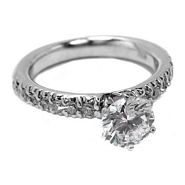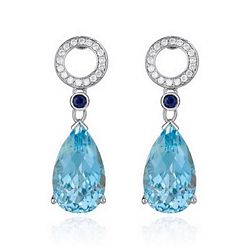Blood Diamonds - Get The FactsNO ADSENSE ACCOUNT SELECTED FOR
GOOGLE ADSENSE
If you are in the market for diamond jewelry, you have in all probability heard the term, “Blood Diamonds also characterized as Conflict Diamonds.” This term represents a dark side of the diamond industry that every buyer should be aware of.
In this brief session we are going to define Blood Diamonds and help you understand why you should inquire about your diamond’s origin.
What Are Blood Diamonds? There are three primary reasons diamonds are considered or classified as Blood Diamonds:
This matter has become so critical that the (UN) United Nations Organization stepped up to the plate and joined the fight against this illegal activity. Here is how the UN defines Blood Diamonds: "...diamonds that originate from areas controlled by forces or factions opposed to legitimate and internationally recognized governments, and are used to fund military action in opposition to those governments, or in contravention of the decisions of the Security Council."
To recap, Blood diamonds are diamonds that have been illegally seized or mined through forced labor for the purposes of funding terrorist activities, civil wars, drug smuggling and money laundering operations by militia, anti-government and other criminally minded elements.
Can you imagine how the average law-abiding citizen would feel knowing that he or she had secretly funded some type of illegal operation through their diamond purchase? That’s another reason why this Blood Diamond issue is so serious.
How Did Blood Diamonds Come About? In short it’s called the law of supply and demand. Diamonds have been and always will be in great demand. They fetch a high price in almost any market, worldwide. The people and companies that mine diamonds and sell them to other countries have learned that there is no shortage of eager buyers.
With the demand so high and the need for diamonds so great, an underbelly element of society has jumped into the game and wreaked havoc. They are the ones who brought about this dark side of the diamond trade.
How Long Have Blood Diamonds Existed? This may shock you, but Blood Diamonds have been around for quite some time now, probably longer than some people are willing to admit. Even so, it wasn’t until December of 2000, that the international community formally recognized the gravity of the situation.
It was then that the United Nations General Assembly recognized the role of rough diamonds in furthering the conflicts in specific areas in Africa. Gratefully, they came up with a resolution aiming to severe the connection between the illegal sales of diamonds and wars in concerned areas.
Has The Steps Taken By The UN Helped? Yes and No! We say “No” because Blood Diamonds still exist in the market place. And we say, “Yes” because they have made some tremendous headway in increasing awareness and curbing some Blood Diamond traffic.
Without question, with the UN resolution in place, countries that buy diamonds from Africa have become more aware of the illicit trade and of the international sanctions that followed. In addition some countries have initiated their own processes and methods to curb the illegal practice of selling Blood Diamonds.
Should I Stop Buying Diamonds Altogether? Absolutely not! There are plenty of diamond jewelers both retail and wholesale, who are acutely aware of the black market diamond trade and they refrain from retailing or wholesaling Blood Diamonds.
The legitimate Diamond Trade is alive and flourishing, providing over 10 million jobs to workers, worldwide. You can have confidence in your purchase when you buy conflict free diamonds. Source: Vicente Ross, http://DiamondExperts.biz/
|
Diamonds Are Forever
Buying Diamonds Guide | Diamond Rings | Diamond Earrings | Diamond Engagement Ring
Wedding Rings | Black Diamonds | Blue Diamond Ring | Diamond Bracelet | Tiffany Diamonds
Loose Diamonds | Fake Diamonds | Famous Diamonds | Bonded Diamonds | Colored Diamonds
Wholesale Diamonds | Platinum Wedding Ring | Diamond Solitaire Ring | Yellow Diamonds
Diamond Jewelry Resources
Jewelers Vigilance Committee | Gemological Institute of America | The Jewelers Board of Trade
American Institute Of Diamond Cutting
|
Blood Diamonds |
Stop Blood Diamonds
Join Stop Blood Diamonds |
Diamond Glossary |
Diamond FAQs |
Diamond Mine
The 4 C's of Diamonds | Diamond
Appraisal | Diamond Certificate
Fine Jewelry Resources
How To Find a
Great Jewelry Repair Shop | How To a Avoid Jewelry Repair
Fiasco | The Jewelry Repair
Guide
Man Made Diamonds
Apollo Diamond | CARAT
| Cubic Zirconia | Diamond Nexus |
Gemisis Cultured Diamond
Moissanite Jewelry | Russian
Diamonds | Swarovski Crystals |White
Sapphire
DIAMONDEXPERTS.BIZ is the leading diamond jewelry and fine jewelry resource on the Internet. We
provide up to date information on all types of diamonds and associated jewelry. Our primary mission is to help you
find the best deal possible on genuine diamond jewelry.
Copyright © Diamond Experts 1997-2012 All Rights Reserved.
Privacy Policy
Powered by the Buy Jewelry
Online
Diamond Experts
Diamond Cutters and Polishers, Goldsmiths, Top-Tier Designers and Diamond
Setting Masters
Antwerp Jewels & Diamond
Manufacturers
Antwerp / Belgium / Brazil / Canada / Europe / Italy / USA and
Worldwide



 Facebook
Facebook Twitter
Twitter Delicious
Delicious Livejournal
Livejournal Reddit
Reddit Stumbleupon
Stumbleupon Yahoo My Web
Yahoo My Web Google Bookmarks
Google Bookmarks BlinkList
BlinkList Digg
Digg Blogmarks
Blogmarks Diigo
Diigo Fark
Fark Ma.gnolia
Ma.gnolia Netvouz
Netvouz Newsvine
Newsvine Slashdot
Slashdot Spurl
Spurl Technorati
Technorati Wists
Wists